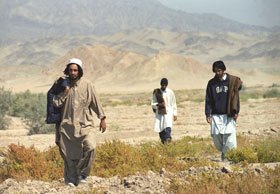 BetterThanMichaelMoore**
BetterThanMichaelMoore** AgitArtVille
First off, let me say right off the top that I think Michael Winterbottom is absolutely brilliant. His range as a film maker is, in my opinion, astonishing.
I recently watched 'In This World' for the second time and was again shaken to the core. And not just by the movie because the story of the making of the movie about two refugees that flee Afghanistan for England overland was also fantastic. That script itself was fictional but the film's two leads were actually Afghans, and one of them, a young kid, did eventually apply for refugee status in Britain. But what I found really fascinating was the fact that the movie itself was made by the cast and crew taking the trip that was actually depicted in the movie.
And now it looks like Mr. Winterbottom has taken it all one step further with 'The Road To Guantanomo'. This time he has used fact and the fictional retelling of those facts according to the principals involved to the tell the story of the 'Tipton Three' who were wrongfully jailed, tortured, and degraded for two years at the Guantanamo Bay Concentration Camp.
Here is a bit of today's review by A.O. Scott in the NY Times:**
It should be emphasized that the movie, directed by Michael Winterbottom and Mat Whitecross, is not a documentary. It does rely on talking-head interviews with the former prisoners — Shafiq Rasul, Asif Iqbal and Ruhel Ahmed, known collectively as the Tipton Three for the town in northern England where they grew up — and faithfully reproduces their version of events. Most of what the audience sees on screen, however, is a re-enactment, conducted mainly by nonprofessional actors. By the time the action reaches Guantánamo — those scenes were shot in Iran — the artifice is unmistakable, since no camera could have penetrated the actual isolation cells, interrogation rooms and chicken-wire cages of Camps X-Ray and Delta. But earlier sequences in Pakistan and Afghanistan have the shaky, grainy urgency of real life captured on the fly.
{snip}
There may still be some die-hards who respond to pictures of hooded prisoners and detailed accounts of physical and psychological abuse with accusations of anti-Americanism. The filmmakers and the Tipton Three are fairly circumspect with regard to their own political beliefs, but their ideological commitments are really beside the point. A news clip shows President Bush referring to the Guantánamo detainees as "bad guys," and it is not necessary to believe that the Tipton Three were good guys — one of them had a police record in Britain — to be appalled at their treatment.
{snip}
The facts on which "The Road to Guantánamo" is based are horrifying, and in its most effective moments it provokes strong feelings of helplessness and dread. But by far the scariest thing about this movie is that, for too many people in this country (the United States) and elsewhere, it may already have lost the power to shock.
OK?
____
*I do not mean to besmirch the work of Mr. Moore here because I do believe that his best work has considerable merit. It's just that I see Mr. Moore as a provocateur who makes you think while Mr. Winterbottom adds an air of true artistry to the mix that really who makes you feel.
**Because of my disgust at much of the stenography that is being done at the New Pravda these days I am now down to just one print day a week, which is pretty much always Friday - for the movie reviews and Krugman (Herbert alone is just not reason enough to shell out $2.50 CDN on other days).
.
No comments:
Post a Comment